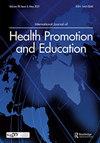Editorial
IF 0.7
Q3 EDUCATION, SCIENTIFIC DISCIPLINES
International Journal of Health Promotion and Education
Pub Date : 2022-09-03
DOI:10.1080/14635240.2022.2139930
引用次数: 0
Abstract
Welcome to the fifth issue of this volume of the International Journal of Health Promotion and Education. There are five papers that bring a diverse mix of topics to this issue. The first paper is A qualitative exploration of interactions with natural environments among immigrant women in Norway by Lorentzen and Viken. It explores the role of nature in improving mental and physical health which is discussed in the context of improving female immigrant population health in Norway. They state that immigrant voices are typically not conveyed in research in the area of nature-connectedness in Norway or other comparable countries arguing the important role of context in transferability of findings in research concerning nature for health. The role of socioeconomic status in a community-based study of diabetes secondary prevention among African Americans is the second paper in which Silberberg et al focus on peer support and professional coaching for African Americans with Type 2 diabetes. They discuss the challenges of reaching socioeconomically diverse racial minority populations and attempting to address diverse needs that require tailored approaches in specific settings to achieve higher levels of health and wellbeing. In the third article There’s an app for that: educational intervention to promote mobile health management app use in rural Ireland by Hawkins and Higgins, a pretest-posttest design was used to examine the effectiveness of educational sessions combined with ‘hands on’ demonstrations of mHealth apps with members of a small community in rural Ireland. They found this was an effective strategy to increase knowledge and remove common barriers in using health promotion apps, to empower individuals to improve their own health. The fourth paper is the Effect of breast self-examination training and follow-up program using the Health Belief Model on Turkish women’s knowledge, attitudes, and practices: A randomized controlled study by Yildirim and Akince. In their sample of 100 women from one region in Turkey, they found that the programmes increased their knowledge about breast health while enhancing their confidence in performing self-examinations. Psychological capital and orientation to happiness as protective factors for coping among first year university students in South Africa acknowledges potential stressors for students adapting to the university environment, culture and academic activities in the final paper in this issue by Asante, Meyer-Weitz and Okafo. Their study highlights the association between optimism, hope and resilience with productive coping in the academic context and the need for constructive psychological resources to support first-year university students. I continue to welcome submissions of original research contribution to the International Journal of Health Promotion and Education.社论
欢迎阅读本卷《国际健康促进与教育杂志》的第五期。有五篇论文为这个问题带来了不同的主题组合。第一篇论文是Lorentzen和Viken对挪威移民妇女与自然环境相互作用的定性探索。它探讨了自然在改善身心健康方面的作用,并在改善挪威女性移民人口健康的背景下进行了讨论。他们指出,在挪威或其他可比较的国家,移民的声音通常没有在自然联系领域的研究中得到传达,他们认为环境在有关自然促进健康的研究结果的可转移性方面发挥了重要作用。社会经济地位在非裔美国人糖尿病二级预防社区研究中的作用是Silberberg等人关注2型糖尿病非裔美国人同伴支持和专业指导的第二篇论文。他们讨论了接触社会经济多样化的种族少数群体所面临的挑战,并试图解决需要在特定环境中采取量身定制的方法以实现更高水平的健康和福祉的各种需求。在霍金斯和希金斯的第三篇文章中,有一个应用程序:促进爱尔兰农村移动健康管理应用程序使用的教育干预,采用前测试-后测试设计来检查教育会议的有效性,并与爱尔兰农村一个小社区的成员一起“动手”演示移动健康应用程序。他们发现,这是一种有效的策略,可以增加知识,消除使用健康促进应用程序时的常见障碍,使个人能够改善自己的健康。第四篇论文是Yildirim和Akince的《使用健康信念模型的乳房自我检查训练和随访计划对土耳其妇女的知识、态度和行为的影响:一项随机对照研究》。在对来自土耳其一个地区的100名妇女的抽样调查中,他们发现这些方案增加了她们对乳房健康的知识,同时增强了她们进行自我检查的信心。Asante, Meyer-Weitz和Okafo在这期的最后一篇论文中指出,心理资本和幸福取向作为南非一年级大学生应对的保护因素,承认了学生适应大学环境、文化和学术活动的潜在压力源。他们的研究强调了乐观、希望和韧性与学术环境中有效应对之间的联系,以及对支持大学一年级学生的建设性心理资源的需求。我继续欢迎向《国际健康促进与教育杂志》提交原创性研究成果。
本文章由计算机程序翻译,如有差异,请以英文原文为准。
求助全文
约1分钟内获得全文
求助全文
来源期刊

International Journal of Health Promotion and Education
EDUCATION, SCIENTIFIC DISCIPLINES-
CiteScore
2.30
自引率
10.00%
发文量
69
 求助内容:
求助内容: 应助结果提醒方式:
应助结果提醒方式:


